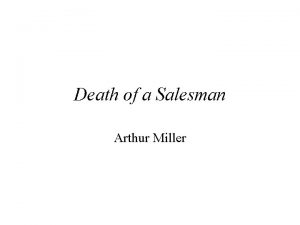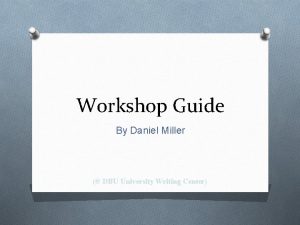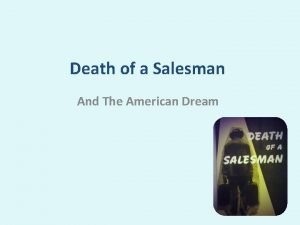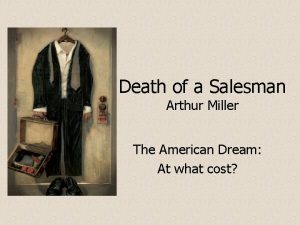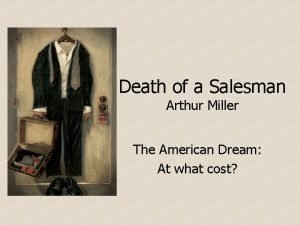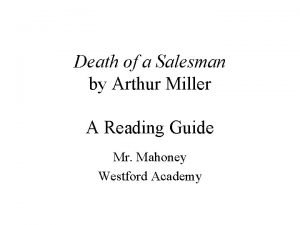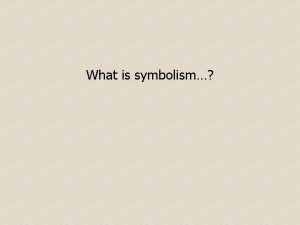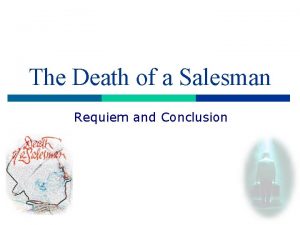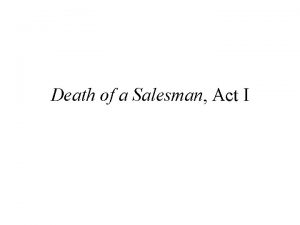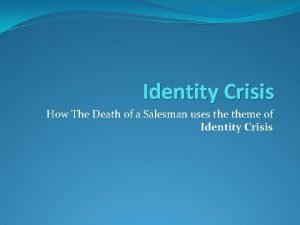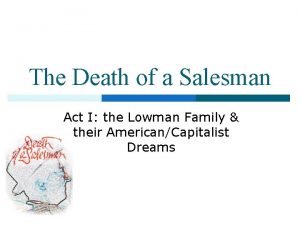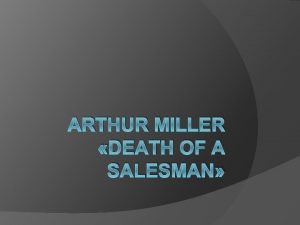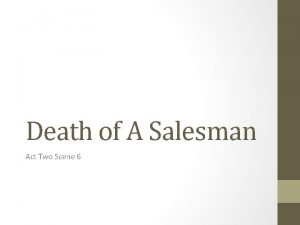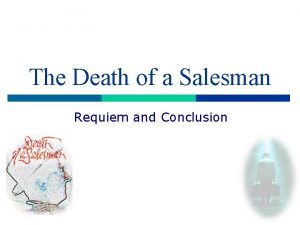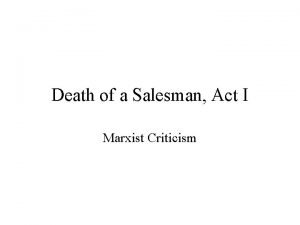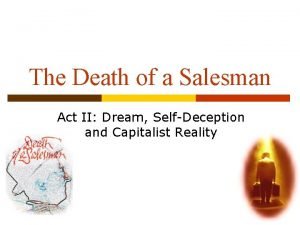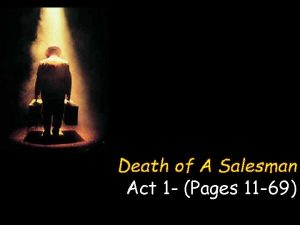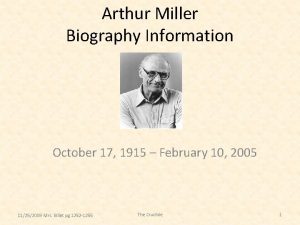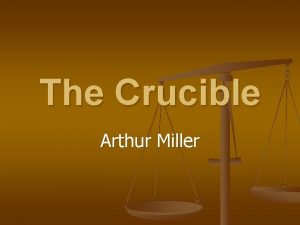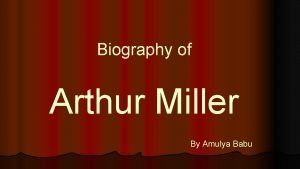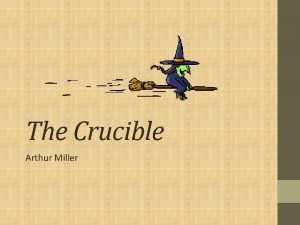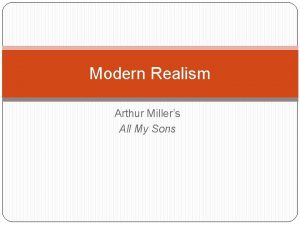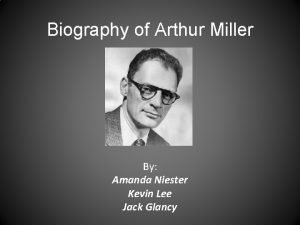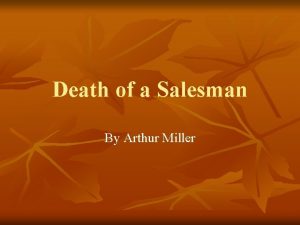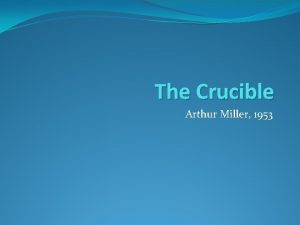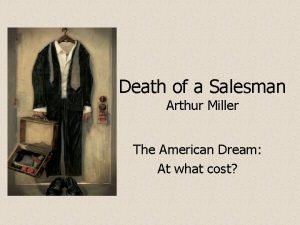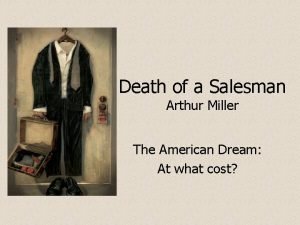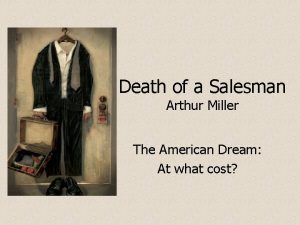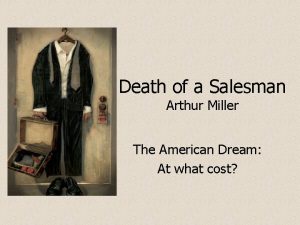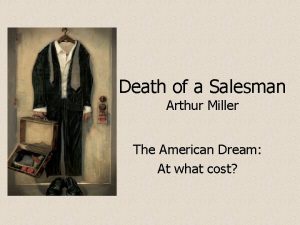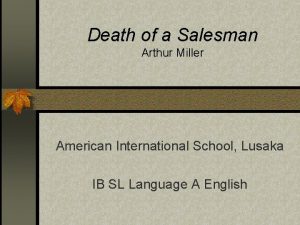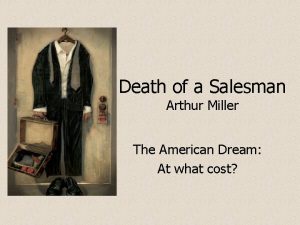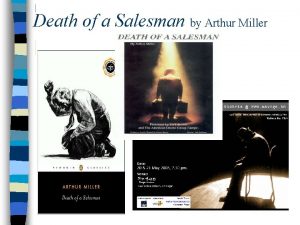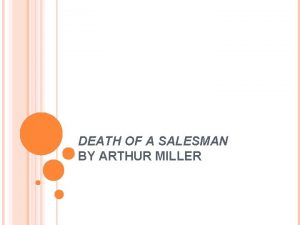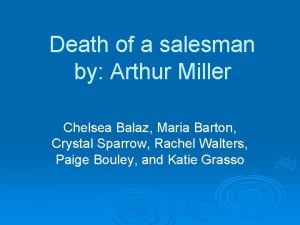Death of a Salesman Arthur Miller The American






































- Slides: 38

Death of a Salesman Arthur Miller The American Dream

About the Playwright: Arthur Miller Ø Born in New York City on October 17, 1915 Ø Began as playwright at University of Michigan Ø Pulitzer Prize winner for Death of A Salesman Ø Double winner of New York Drama Critics Circle Award

Miller’s Legal Troubles Ø Suspected of being a Communist sympathizer Ø Death seen as un-American Ø Miller has troubles with the HUAC/Mc. Carthy Ø 1953 - Miller denied a passport Ø 1955 - HUAC pressures NYC not to allow Miller to make a film for them on juvenile delinquency

The Saga Continues. . . Ø 1957 - Miller convicted of contempt of Congress for refusing to names And then. . . Ø 1958 - US Court of Appeals overturns his contempt conviction

Miller’s Assertions Ø Death is not a “document of pessimism. ” Ø Death is not un-American; it celebrates the life of Willy Loman. Ø Miller believes that tragedy is “inherently optimistic. ”

From Classical Tragedy Ø Unity of time -- the final 24 hours in Willy’s life Ø Unity of action - the play is complete unto itself Ø the tragic hero…with a twist

Also from Classical Tragedy Ø the hero’s traits, esp. being a mixture of good and bad and being of higher moral worth than others in society Ø the concept of the hero’s flaw Ø the hero’s capacity to willingly endure suffering Ø the catharsis of the audience

Initial Themes Ø Addresses family conflict in post World War II America Ø Takes a close look at the price paid for the “American Dream” Ø Charges America with creating a capitalist materialism centered around a postwar economy Ø This materialism skewed the original view of the “American Dream” as envisioned by the founding fathers

The American Dream Ø Arthur Miller suggests that the American Dream is, for the most part, unattainable. Only those who are lucky enough to be in the right place at the right time will prosper, and the rest will struggle for their entire lives and never reach the material and emotional success embodied in the American Dream. Ø Willy is obsessed with the American Dream and the idea of being able to give his family whatever they desire. Ø Miller's depiction of the Lomans as an average family struggling to fulfill their dreams shows his belief that the American Dream is a goal that, for many families, will never be reached. Ø Willy knows that he is not living the American Dream because his salary is not enough to pay his debts, but he also knows that his family expects him to provide for them, and he is frustrated with his failure.

The American Dream Ø Miller asserts that because people are so fixed on the American Dream, they are not able to enjoy the lives that they have made for themselves. Ø The American Dream creates a false hope that prevents people from being proud of what they have accomplished to make their lives better than they would be in other countries. Ø Willy feels inadequate because he has not found the success promised in the American Dream and is so consumed with the desire to fulfill the dream that he is willing to take his own life. He wants to know that he has succeeded in providing for his family and is admired by his sons.

The American Dream Ø Motivation of looking to others who are successful. Ø Willy's brother Ben represents everything Willy has ever dreamed of and is trying to achieve. Ben's adventurous nature embodies one of the key ideas in the American Dream, that of seeking the greatest opportunities in order to gain wealth Ø The memory of Ben torments Willy even years after their last contact because Willy is jealous of the fact that Ben went out and struck a fortune. Ø Willy wishes he had taken advantage of his youth in ways similar to his brother so that he too could be living the American Dream. Ø Ben is given an elevated status for his achievements in fulfilling the American Dream, and he is a guiding point for the Loman family.

The American Dream Ø In the end, Willy does not understand that he should be proud of the fact that he has lived and worked in American and raised two sons. He has done his best, but the idea of the American Dream has prevented him from enjoying his life in America because he is too busy trying to attain the impossible dream, by looking to others and being overly hard on himself. Miller suggests that the idea of the American Dream inhibits people from enjoying the success they have found in America.

Themes in Death Ø Willy Loman as a modern tragic hero Ø An individual’s search for meaning and purpose in life (not Willy, but Biff) Ø failure in pursuit of success Ø Man’s need to “leave a thumbprint somewhere in the world. ” Ø An examination of the materialistic values of society

More themes in Death Ø The love of a father for a son and a son (Biff) for a father Ø The conflict between father and son Ø The question of who shall wield the power? Ø the problem of communication

Add: Themes Ø Abandonment: The not-so-positive transient nature of mankind Ø Gender Relations Ø Betrayal: Willy’s primary obsession (Biff) Ø Madness Ø Perills of modernity (Growth) Ø Nostalgia/Regret Ø Opportunity

Symbols Ø Seeds: opportunity for growth, but will not always germinate. Ø Diamonds: Material & tangible wealth Ø The Woman’s Stockings: betrayal and infidelity. Ø The Rubber Hose: Suicide Ø Alaska, Africa…The American West: success and failure

Symbols Ø Falling/Down: failure of family and work and life Ø Stealing: stealing (fiancés or objects) represents the boys true identities and how they have been stolen by lying and the pursuit of unachievable dreams. Ø The jungle/woods: symbols of life. Ben is not afraid to take risks in life. He took control. He tells Willy “the jungle is dark but you must walk in to it. ” encouraging suicide as a form of taking control.

Characteristics of the Tragic Hero "A man doesn't become a hero until he can see the root of his own downfall. " ~Aristotle Six Characteristics of the Tragic Hero: Ø Nobility or wisdom (by birth) Ø A flaw or error of judgment (Hamartia) Ø A reversal of fortune (perepetia) Ø The discovery or recognition that the reversal was brought about by the hero's own actions (anagnorisis) Ø The audience must feel dramatic irony for the character. Ø The character's fate must be greater than deserved.

Key Traits of the Tragic Hero Ø Usually evokes empathy… Ø Has a weakness, usually pride Ø Something has gone awry in his/her life Ø Usually faced with a very serious decision he must make Ø Noble in nature Ø Must understand his mistakes… Ø Likely doomed from the start… Ø Begins his “journey” as no better or worse than the rest of us…

The Common Man as Hero Miller’s thoughts: Ø “Everyone knows Willy Loman. ” (allusion to the morality play, Everyman. ) Ø “The common man is suitable for a tragic hero. ” Ø Willy is meant to be seen as greater and better (at least in potential) than his society.

Miller’s Modern Tragedy Ø The hero is a common man. Ø The hero struggles against society. Ø The hero meets his downfall. Ø The downfall is a result of an incongruity between his own perception of the world and reality. Ø The hero achieves a kind of redemption in his downfall.

Act 1 An air of the dream clings to the place, a dream rising out of reality. Ø How does this serve to foreshadow Willy Loman’s life?

Major Characters Ø Willy Loman Ø Biff Loman Ø Linda Loman Ø Happy Loman Ø Charley Ø Bernard Ø Ben Ø The Woman Ø Howard Wagner Ø Stanley Ø Jenny Ø Miss Forsythe and Letta

Willy Loman Ø Father, traveling salesman Ø Believes in chasing the American Dream although he never achieves it Ø Pins his failed hopes on his sons, Biff and Happy Ø Becomes mentally ill when pressure of reality crushes his illusions

Biff Loman Ø Elder son, 34 years old Ø High school standout-football star, many male friends, and female admirers Ø Academic failures lead to a life of kleptomania Ø Represents Willy’s vulnerable, tragic side Ø Fails to reconcile his father’s expectations

Linda Loman Ø Loving, devoted wife Ø Naïve and realistic of Willy’s hopes Ø Emotionally supportive of Willy Ø Willy’s strength until his tragic perishing

Happy Loman Ø Younger son, 32 years old Ø In Biff’s shadow all his life Ø Relentless sex and professional drive Ø Represents Willy’s sense of self importance and ambition Ø Often engages in bad business ethics

Charley Ø The Lomans’ next door neighbor Ø Successful businessman Ø Often gives Willy financial support Ø Described sadly as Willy’s only friend although Willy is jealous of Charley’s success

Bernard Ø Charley’s son Ø Successful lawyer Ø Often mocked by Willy for being studious Ø Compared to Loman sons by Willy; they do not measure up to his success

Ben Ø Willy’s deceased older brother Ø Independently wealthy Ø Appears to Willy in daydreams Ø Willy’s symbol of success that he desperately wants for his sons

The Woman Ø Willy’s mistress Ø Her admiration for Willy is an ego boost Ø Biff catches Willy with her in a hotel room Ø Biff loses faith in his father due to infidelity

The Father/Son Dynamic Ø Willy has infused his sons with the same fundamentally wrong sense of morality and of what is important in life that has hindered his own success and happiness; the sons find themselves equally trapped and suspended in time without the ability to succeed

The Father/Son Dynamic Ø Blatantly preferring his older son Biff, Willy put not only his hopes but also immense pressure on him from an early age Ø Once aware of the affair, the son’s godlike reverence of Willy was shattered and Biff wondered around devoid of any sense of purpose, a bum surviving through low-wage labor and stealing.

The Father/Son Dynamic Ø When the family is reunited once again under one roof, the father’s pressure on and control over his sons, especially Biff, once again refuel the old conflicts between them and ultimately lead to Biff’s decision to leave and never come back.

The Father/Son Dynamic Ø Torn between what he knows he must do and the love he feels for his father, Biff hugs Willy one last time. It is at that moment that Willy becomes aware of Biff’s love for him. Ø It is a textbook example of the human affection exchange theory of male behavior, which finds that fathers and sons very seldom express their affection for each other directly through verbal statements or direct non-verbal gestures.

The Father/Son Dynamic Ø This, together with the loss of his job, prompts Willy to finally commit a long considered suicide in order to bequeath twenty thousand dollars of life insurance money to Biff

The Father/Son Dynamic Ø Happy was always considered second. Ø This has left him with an even stronger desire to please his father in any way he can. Ø His function within the story is an important one as he acts as a buffer between Biff and Willy. Ø He eventually becomes the next generation of the tragic hero that was Willy Loman.

The Message Ø It is not only one of the limits of the American Dream and that it cannot apply to everyone, but of the necessity of the sons outgrowing their fathers, of the importance and value of the next generation to break loose from their forbears.
 Themes of death of a salesman
Themes of death of a salesman Daniel miller arthur miller
Daniel miller arthur miller Death of a salesman as an american tragedy
Death of a salesman as an american tragedy Death of a salesman themes
Death of a salesman themes Setting of death of a salesman
Setting of death of a salesman American dream in death of a salesman
American dream in death of a salesman Themes in death of a salesman
Themes in death of a salesman The death of the salesman summary
The death of the salesman summary Seeds symbolism
Seeds symbolism Requiem death of a salesman
Requiem death of a salesman The death of a salesman themes
The death of a salesman themes Death of a salesman act one summary
Death of a salesman act one summary Flute music death of a salesman
Flute music death of a salesman Death of a salesman act 3
Death of a salesman act 3 Identity in death of a salesman
Identity in death of a salesman Expressionism death of a salesman
Expressionism death of a salesman Death of a salesman act 1 summary
Death of a salesman act 1 summary Death of a salesman shmoop
Death of a salesman shmoop Death of a salesman act two summary
Death of a salesman act two summary Conclusion of the death of a salesman
Conclusion of the death of a salesman Death of a salesman marxist criticism
Death of a salesman marxist criticism Death of a salesman essay questions and answers
Death of a salesman essay questions and answers Death of a salesman historical context
Death of a salesman historical context Naturalism in death of a salesman
Naturalism in death of a salesman Death of a salesman act 2
Death of a salesman act 2 Death of a salesman act 1 summary
Death of a salesman act 1 summary Arthur miller introduction
Arthur miller introduction Arthur miller information
Arthur miller information Arthur miller background
Arthur miller background Amulya babu
Amulya babu The crucible overture questions
The crucible overture questions Www.enotes.com
Www.enotes.com Arthur asher miller
Arthur asher miller Arthur miller realism
Arthur miller realism How did miller's social conscience affect his work?
How did miller's social conscience affect his work? Facts about arthur miller
Facts about arthur miller Dr arthur miller
Dr arthur miller Dgp week 11 answers
Dgp week 11 answers Miller school waldoboro
Miller school waldoboro
